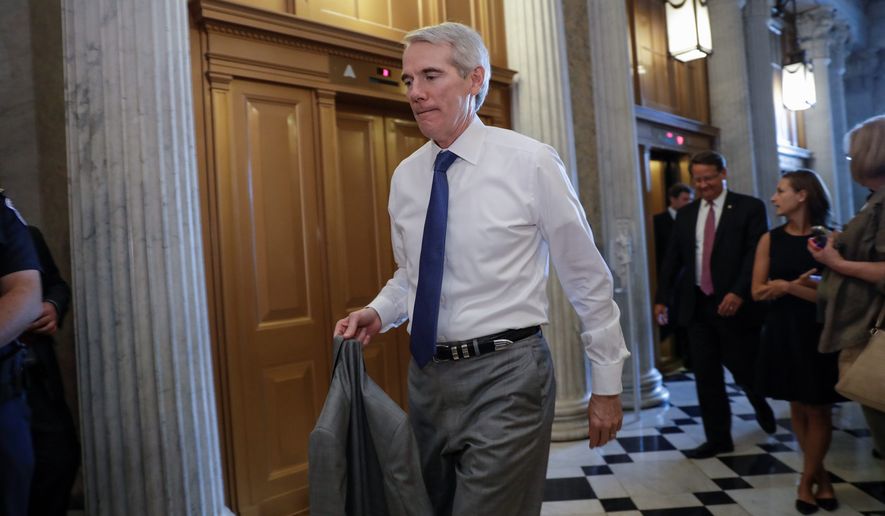Sen. Rob Portman learned from a sheriff in Ohio in 2016 that fentanyl, the deadly synthetic opioid that has cut a path of death and destruction through American communities, was being shipped through the mail, from shady overseas manufacturers right into the hands of drug dealers and addicts.
The Ohio Republican later that year wrote the first bill to require the U.S. Postal Service to procure data on foreign packages, giving postal inspectors and customs agents at least a fighting chance to find the poisonous packages.
Now two years later, after tens of thousands of deaths and a Senate probe that found buying fentanyl requires little more than a Google search, a credit card and a mailbox, Mr. Portman can finally see the finish line: Senators will vote on his bill this week, as part of a broader effort to stamp out the U.S. addiction crisis.
“This will be something my colleagues will be happy to vote on because fentanyl is in every state now. And it is the No. 1 killer, when you look at statistics,” Mr. Portman said on the phone from southern Ohio, where he was visiting the first responders who had treated inmates and staff members sickened by contraband fentanyl at a Ross County prison.
Heroin and prescription painkillers have been a growing issue, but the emergence of powerful synthetic opioids such as fentanyl changed the equation. They were involved in nearly 30,000 of the record 72,000 overdose deaths the U.S. recorded in 2017.
For those whose states were hit early, the devastation was clear.
“I got frustrated at one of the hearings. I said how many more people have to die before we do something about this?” Mr. Portman said. “When it’s something this obvious and this urgent, I would hope that Congress could move more quickly in the future.”
The House passed its version of the Portman bill with other anti-opioid measures in June. But it took months of more argument and delay for the Senate to schedule floor action.
His bill, the Synthetics Trafficking and Overdose Prevention, or STOP Act, requires advanced electronic data on packages entering the U.S. through the mail. All packages from China, and 70 percent of the overall flow, must have the information available by the end of this year, and 100 percent global compliance is due by 2021. Private shippers UPS and FedEx already collect data on packages entering the U.S.
When fully implemented, the U.S. Postal Service must reject packages that don’t contain the data.
His legislation is a marquee piece of a sweeping opioids package compiled by four Senate committees. Other measures include allowing the Food and Drug Administration to require opioid makers to sell pills in “blister packs” of three- to seven-day supplies; permitting the National Institutes of Health to devote more funding to developing non-addictive painkillers; and clarifying that states can use Medicaid dollars to treat babies born with opioid withdrawal symptoms.
The Postal Service on Tuesday said it “fully supports” Mr. Portman’s goal of increasing advanced electronic data on packages.
“By working closely with the Department of Homeland Security, Customs and Border Protection and other federal and law enforcement agencies, and through improved investigative techniques, we are helping to keep illicit drugs like fentanyl out of the hands of the American public,” said USPS spokesman David Partenheimer.
The Senate bill will have to be reconciled with the House’s version, likely after the elections.
Both chambers pushed similar ideas, though a notable difference is the treatment of Medicaid assistance.
The House bill would lift a ban on Medicaid funding for mental health facilities with more than 16 beds, saying it’s an antiquated holdover from a time when the nation feared “warehousing” of people in asylums.
The change would cost money, however, and it would be paid for by asking private insurers to pay for an additional three months of dialysis care before Medicare takes over. The proposal angered the insurance lobby, and senators decided to avoid the issue and wait to see if another funding mechanism can be worked out in a conference with the House.
Mr. Portman said conferees also will need to work through language in the House bill that applies to addiction to opioids or cocaine, but not other drugs.
He said the STOP Act has more universal agreement and could be pulled from the package and passed separately, giving customs agents the ability to spot packages from regions known for fentanyl production or packages whose destinations are linked to a line of suspicious packages.
“All this information can be compiled now, and they can put together algorithms that help them decipher this if they get it in advance,” Mr. Portman said.
“Boom! They’re on that package, and it’s taken off the line.”
• Tom Howell Jr. can be reached at thowell@washingtontimes.com.




Please read our comment policy before commenting.